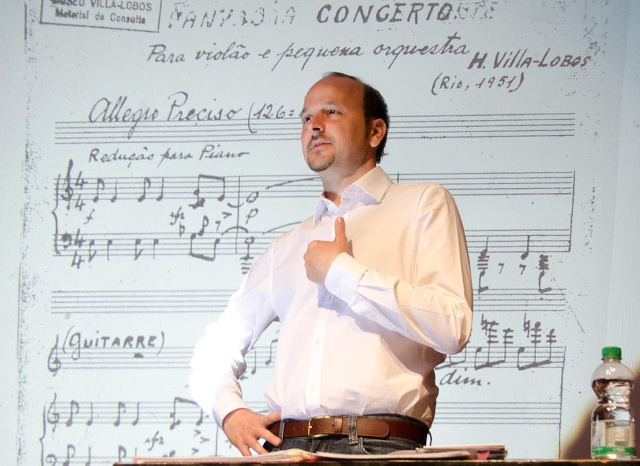Lectures
“The guitar work of Heitor Villa-Lobos in a new light”
Source research as an important basis for musical interpretation
The study of manuscripts and existing sources usually opens up unimagined new perspectives that can influence the understanding and interpretation of a work. As part of the lecture, an introduction to source research will be given and the manuscripts of Heitor Villa-Lobos will be used to re-examine his guitar work. In the course of the lecture, largely unknown guitar works by Villa-Lobos will also be presented.
(e.g. Münster University of Music, Nürtingen International Guitar Festival, Nuremberg University of Music, Chopin Academy Warsaw, Hamburg Guitar Festival, Leopold Mozart Center Augsburg, Gitarre Innovativ Lüneburg, International Guitar Festival Benediktbeuren, University of Music and Dance Cologne/Wuppertal, State University of Music and Performing Arts Stuttgart, Anton Bruckner Private University Linz, Chord Festival Hochrhein, International Guitar Festival Wertingen, In Guitar Festival Winterthur, Vocational School of Music Bad Königshofen)
.
“Do it your way”
The individual path as a musician between creativity and market economy
The enthusiasm about a creative and artistically oriented life and the joy of making music often leave considerations based on professional perspectives and their own market positioning in the background. An honest examination of one’s own possibilities and visions help to develop the individual skills better in the professional context. As an internationally renowned concert guitarist, Johannes Tonio Kreusch is also active in cultural management. As part of the workshop, he will give an insight into his work as artistic and organizational director of festivals, concert series and workshops, as a publisher and producer as well as in tournée management, marketing and management seminars. In addition, it will shed light on the framework conditions for self-marketing and encourage them to engage with their own perspectives.
(e.g. Hamburg Guitar Festival, Augsburg International Guitar Festival, Hersbruck International Guitar Festival)
.

.
“Johann Sebastian Bach on guitar: interpretation and transcription suggestions”
Source research as an essential prerequisite for a established transcription: By studying the traditional sources, one enters into a dialogue with a composer. This usually opens up unimagined horizons and new ways of looking at things. This approach can also provide a clearer sense of the original sound of the respective music. After intensive research on the origin and origin of the work to be transcribed, it is possible to search for sound and playing possibilities in order to interpret the music adequately on the available instrument.
(e.g. guitar festival “Alvaro Mantovani”, Italy; Tbilisi State University, Georgia; Karol Lipiński Academy of Music, Wrocław; Gitarrentage Schwaig)
.
“Performance training for guitarists”
Technical development demands not only machines faster and more perfect actions and modes of action, but also from humans. Time for muse, for reflection, for encounters with art is becoming more and more a luxury. In the field of tension between perfection and artistic expression, musicians encounter an audience pampered by superlatives and demanded by everyday life. The lecture provides guidance on concert preparation and dealing with performance fears and aims to provide impulses for the development of one’s own artistic identity.
(e.g. Hamburg Guitar Days, Kulturburg Hengebach, Ottobrunner Meisterkurse)
.
“New Cuban Guitar Music”
With Cuban artists such as Ernesto Lecuona, Amadeo Roldán, Alejandro García Cartula, Alejo Carpentier, Fernando Ortiz and Wilfredo Lám, the movement of “Afrocubism” developed, through which the African element, as well as the many influences of other cultures, became an integral part of Cuba’s cultural identity. In fact, Cuban culture can be described as a “tropical cocktail” in which influences from Spain, France, Nigeria and, due to the many Chinese immigrants, also from Asia, are mixed. All the colors that are reflected in the faces of the people and the rich landscapes of Cuba.
Against this background, the contemporary Cuban composer Tulio Peramo composes new music for guitar and has enriched the guitar repertoire with his extensive oeuvre. The lecture will provide an insight into his work and shed light on the origins of Cuban music.
(including La Salle University Philadelphia, Royal Welsh College of Music and Drama Cardiff)
.
“How do I work with compositional ideas?”
From improvisation to composition and new composition possibilities by expanding the sound space with scordature, preparations and unusual playing techniques.
(e.g. Carl Maria von Weber Dresden University of Music)